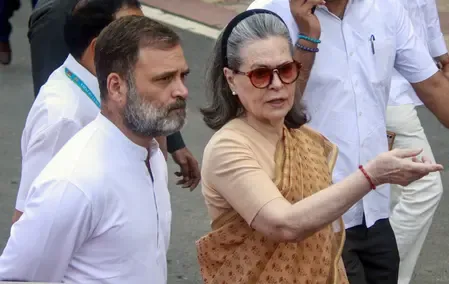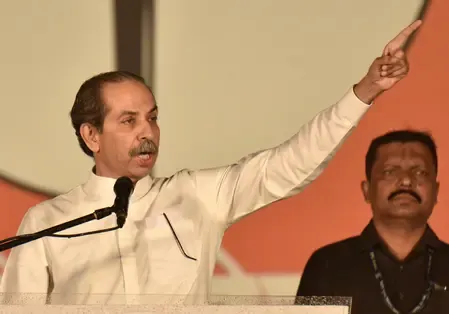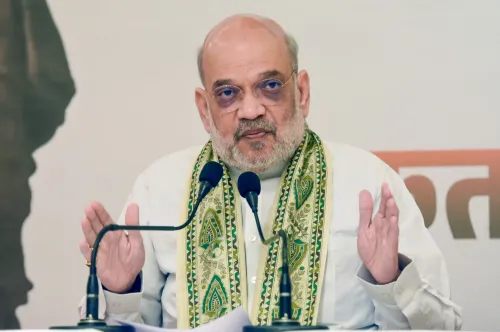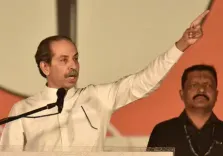Did Sonia and Rahul Gandhi Benefit from Rs 142 Crore Linked to the National Herald Case?

Synopsis
Key Takeaways
- Sonia Gandhi and Rahul Gandhi are accused of benefiting from Rs 142 crore linked to alleged money laundering.
- The ED claims a prima facie case under the PMLA against the Gandhis and others.
- Assets valued at Rs 661 crore were attached by the ED in this case.
- The National Herald, a pivotal publication, ceased operations in 2008.
- The investigation has sparked significant political discourse in India.
New Delhi, May 21 (NationPress) The Enforcement Directorate (ED) informed a Delhi court on Wednesday that Sonia Gandhi, Chairperson of the Congress Parliamentary Party, and Rahul Gandhi, Leader of the Opposition in the Lok Sabha, have benefited from Rs. 142 crore categorized as "proceeds of crime" in the ongoing National Herald money laundering investigation.
Additional Solicitor General S.V. Raju, who represents the ED, stated that the accused have been profiting from these proceeds until the federal anti-money laundering agency attached assets linked to the National Herald case in November 2023.
Furthermore, ASG Raju asserted that the accused engaged in money laundering not only upon acquiring these proceeds but also while retaining them.
The ED maintains that a prima facie case under the Prevention of Money Laundering Act (PMLA) has been established against the Gandhis, Congress Overseas Chief Sam Pitroda, Suman Dubey, and others.
After the preliminary arguments from the ED, Special Judge Vishal Gogne at Rouse Avenue Courts directed that the case will proceed on a daily basis from July 2 to July 8 for submissions from both the central agency and the accused.
Meanwhile, the judge instructed the probe agency to provide a copy of the prosecution complaint to BJP leader Subramanian Swamy, who initiated the money laundering investigation with a private complaint.
In a prior hearing on May 2, the Rouse Avenue Courts had requested the Gandhis and other accused to justify why cognizance should not be taken against them based on the ED’s charge sheet.
The anti-money laundering agency has filed a prosecution complaint against senior Congress figures, including the Gandhis. Others listed in the charge sheet are Congress Overseas Chief Pitroda, Suman Dubey, among others.
This charge sheet values the alleged proceeds of crime at Rs 988 crore. The allegations suggest that the Congress leadership misappropriated property belonging to Associated Journals Limited (AJL), the original publisher of the National Herald, by transforming public trusts into personal assets.
The National Herald, a publication founded by Jawaharlal Nehru and other notable leaders in 1938, was established to voice liberal opinions within the Congress. Published by AJL, the National Herald served as a vital tool for the Congress during the freedom movement and in the post-independence era. In addition to the English version, AJL produced publications in Hindi and Urdu. However, the newspaper ceased operations in 2008 due to debts exceeding Rs 90 crore.
The controversy surrounding its assets gained attention in 2012 when BJP leader Swamy filed a complaint alleging that Congress leaders had committed cheating and breach of trust while acquiring AJL. According to Swamy, the firm Young Indian Ltd, in which Sonia and Rahul Gandhi hold majority stakes, acquired control over the newspaper's substantial assets through a "malicious" takeover intended to personally benefit the party leadership.
During the investigation, the ED found that the accused, including Sonia Gandhi and Rahul Gandhi, used Young Indian to take over AJL’s assets for a mere Rs 50 lakh. The agency claimed that Young Indian, beneficially owned by the Gandhis, effectively took control of AJL's properties while significantly undervaluing their market worth. In November 2023, the ED attached immovable properties worth Rs 661 crore and AJL shares valued at Rs 90.2 crore, labeling them as suspected proceeds of crime.









